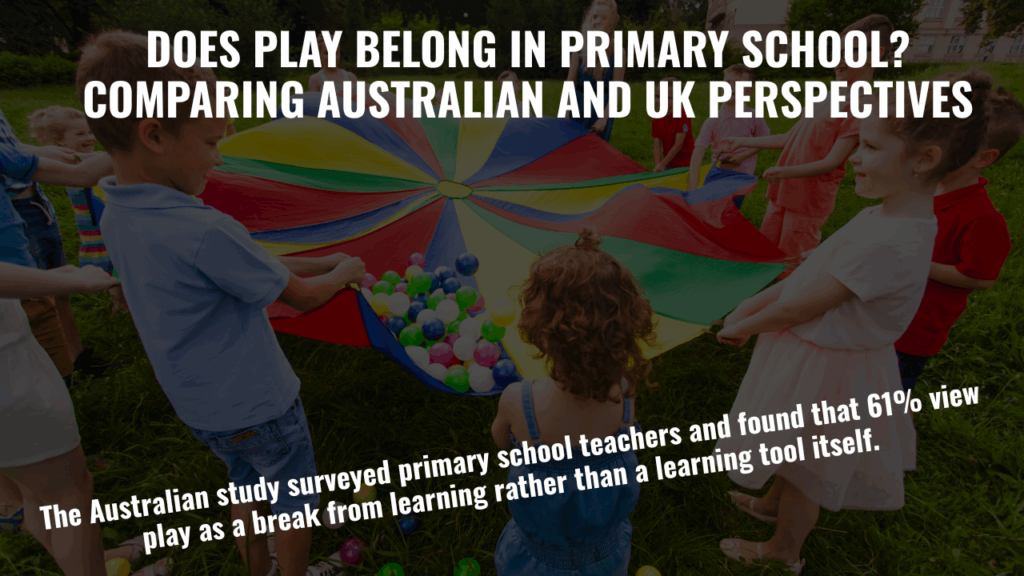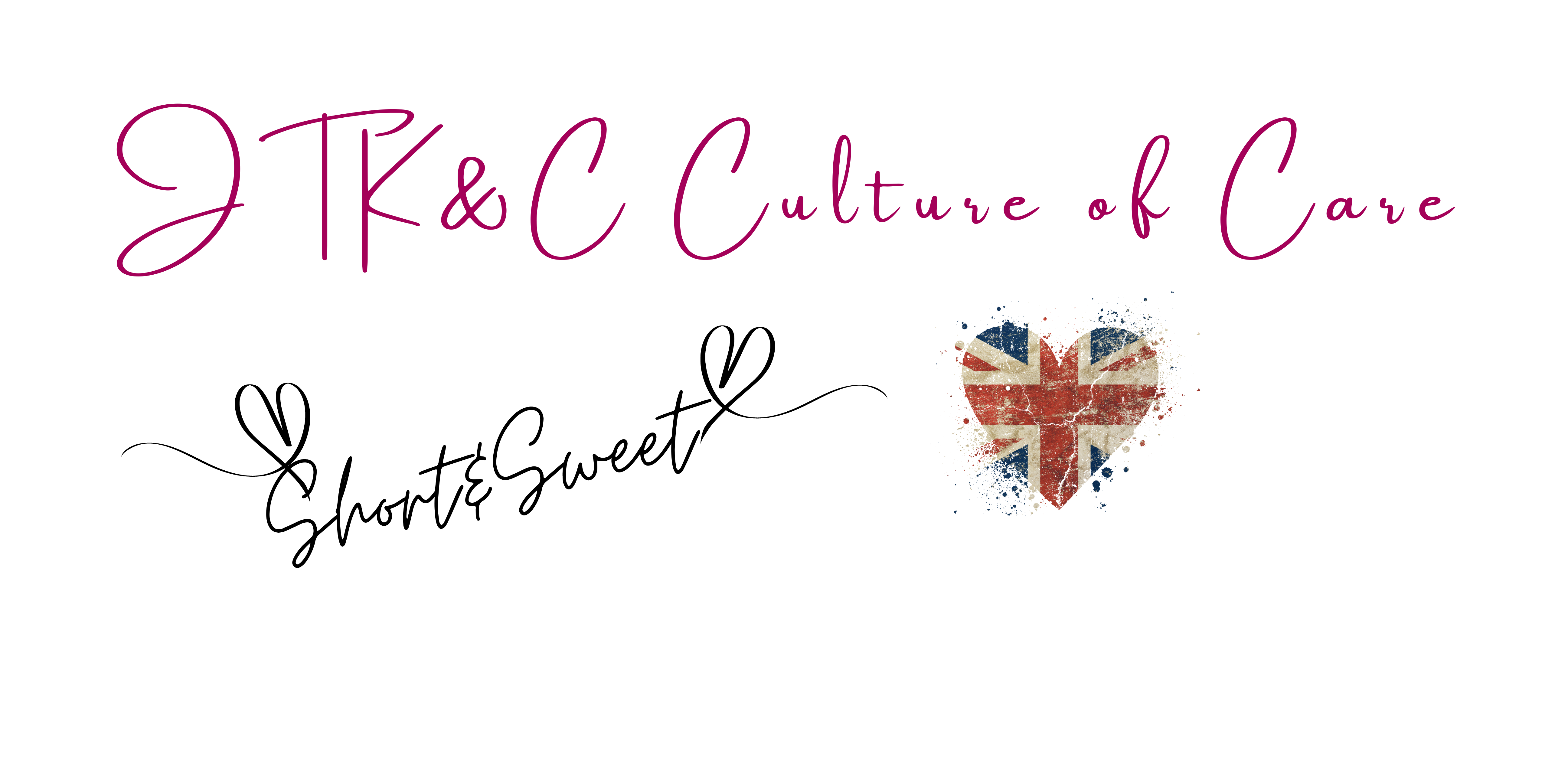Play is widely celebrated as a cornerstone of early childhood education, fostering creativity, social skills, and independence. However, its role in primary school remains contentious, with new research revealing uncertainty among teachers in both Australia and the UK. A recent Australian study, published in The Conversation, highlights teachers’ ambivalence about integrating play into primary education, citing curriculum pressures and unclear pedagogical roles (https://theconversation.com/does-play-belong-in-primary-school-new-research-suggests-teachers-are-not-sure-259800). How does this compare to the UK, where similar debates unfold? This article explores teacher perspectives, barriers, and potential pathways for play-based learning in both countries, drawing on recent research.

Australian Perspectives: Play as a Break, Not a Bridge
The Australian study surveyed primary school teachers and found that 61% view play as a break from learning rather than a learning tool itself. While 77% acknowledge play’s role in developing social skills, many struggle to integrate it into the curriculum due to time constraints and a packed syllabus. Teachers also conflate “play” with “play-based learning,” leading to confusion about how to use play pedagogically. For example, some see play as unstructured free time, while others attempt to structure it but lack clarity on best practices.
The study identifies several barriers:
- Curriculum Demands: Teachers feel pressured to cover mandated content, leaving little room for play. One teacher noted, “Play is fantastic for children but a challenge when there is so much limited time to cover such a huge curriculum” (https://theconversation.com/does-play-belong-in-primary-school-new-research-suggests-teachers-are-not-sure-259800).
- Uncertain Roles: Teachers are unsure whether to structure play, supervise passively, or engage actively, reflecting a lack of training in play-based pedagogies.
- Missed Opportunities: Play could enhance learning e.g., using LEGO for math or games for science, but without clear guidance, its potential remains untapped.
The authors advocate for better teacher training, professional development to align play with curriculum goals, and policy reforms to bridge early childhood and primary education approaches.
UK Perspectives: A Formal System with Play on the Margins
UK research echoes many Australian concerns but operates within a more formalised education system, particularly in England. A 2023 study by Holly Amber Stokes, surveying 203 teachers, found that 82% of children aged 5–12 believe play-based learning helps them “learn more and learn better”. Yet, opportunities for play in primary schools, especially in Key Stages 1 and 2 (ages 5–11), are limited due to a focus on academic outcomes and standardised testing, such as SATs.
Key findings from UK research include:
- Benefits Recognised: Like Australian teachers, UK educators acknowledge play’s role in cognitive, social, and physical development. However, play is often side-lined as schools prioritise structured lessons (https://my.chartered.college/impact_article/researching-play-based-pedagogies-in-year-1/).
- Barriers to Implementation: Stokes’ study identifies multiple obstacles:
- Curriculum Pressures: The National Curriculum’s rigidity and assessment-driven culture restrict playtime, similar to Australia’s challenges.
- Teacher Knowledge Gaps: Many teachers lack training in play-based pedagogies, leading to uncertainty about implementation. A 2020 study by the London South Teaching School Alliance noted that the rapid shift to formal learning in Year 1 reduces student engagement and independence (https://my.chartered.college/impact_article/researching-play-based-pedagogies-in-year-1/).
- Systemic Constraints: Reduced break times (noted as a “marked reduction” over 25 years) and limited classroom space or resources further limit play (https://www.nuffieldfoundation.org/project/understanding-the-impact-of-play-on-child-development).
- Teacher Roles: A 2024 systematic review highlights that teachers can act as planners, facilitators, or co-players in play-based learning but often lack the conceptual or practical knowledge to do so effectively. Some intervene too formally, undermining play’s spontaneity (https://bera-journals.onlinelibrary.wiley.com/doi/10.1002/berj.4086).
Innovative practices exist, such as at Hanover Primary in Islington, where play-based approaches extend to Year 2 through shared creative spaces (https://my.chartered.college/impact_article/researching-play-based-pedagogies-in-year-1/). However, these are exceptions in a system where formal learning dominates early.
Comparing Australia and the UK
Similarities
- Perceived Value vs. Practice: In both countries, teachers recognise play’s developmental benefits but often see it as separate from academic learning. In Australia, 61% view play as a break, while UK teachers similarly prioritise curriculum over play due to assessment pressures.
- Barriers: Curriculum demands, time constraints, and lack of training hinder play-based learning in both contexts. Teachers in both nations struggle to define their role—whether to structure play or let it unfold naturally.
- Confusion Over Terminology: Both Australian and UK teachers conflate “play” with “play-based learning,” leading to inconsistent implementation. UK research notes that overly formal interventions can reduce play’s effectiveness, a concern also implicit in Australia’s findings.
Differences
- Systemic Context: England’s education system formalises learning earlier (Year 1, age 5–6) compared to Australia, where early childhood education (birth to 5) strongly emphasises play, creating a sharper transition to primary school. Wales, however, offers a progressive model with play-based learning until age 7, which Australia lacks (https://my.chartered.college/impact_article/researching-play-based-pedagogies-in-year-1/).
- Specific Concerns: UK research highlights unique issues, such as reduced break times and high teacher stress, which exacerbate resistance to play-based approaches. These are less prominent in the Australian study but likely relevant given similar workload pressures.
- Policy Models: The UK benefits from regional variation, with Wales’ play-based curriculum showing positive outcomes for attainment and wellbeing. Australia’s national framework lacks such a model, though its early childhood emphasis on play could inform primary reforms.
Pathways Forward
Both Australia and the UK stand to gain from rethinking play’s role in primary education. Key recommendations include:
- Teacher Training: Both countries need professional development with practical examples of play-based learning, such as using games for science or collaborative play for social skills. Training should clarify teachers’ roles as facilitators or co-players.
- Policy Reform: Emulating Wales, both nations could integrate play into primary curricula, balancing academic and developmental goals. Policy should bridge early childhood and primary approaches to ease transitions.
- Research and Advocacy: Ongoing studies, like Stokes’ in the UK and the Australian survey, should guide policy by showcasing successful practices and teacher perspectives. Schools like Hanover Primary demonstrate what’s possible with systemic support.
Conclusion
Play’s potential in primary schools is undervalued in both Australia and the UK, where curriculum pressures and lack of training marginalise its use. While teachers in both countries recognise play’s developmental benefits, they struggle to integrate it pedagogically, often viewing it as a break rather than a learning tool. The UK’s formalised system and reduced break times pose unique challenges, but Wales’ play-based curriculum offers a model for reform that Australia could consider. By investing in teacher training and policy changes, both nations can harness play’s power to enhance learning, fostering creativity and resilience in primary school children.
References
- The Conversation. (2025). “Does play belong in primary school? New research suggests teachers are not sure.” https://theconversation.com/does-play-belong-in-primary-school-new-research-suggests-teachers-are-not-sure-259800
- bps.org.uk (2023) The barriers to utilising play-based learning in England’s primary school classrooms https://www.bps.org.uk/news/barriers-utilising-play-based-learning-englands-primary-school-classrooms
- Stokes, H. A. (2023). “Researching play-based pedagogies in Year 1.” Chartered College of Teaching. https://my.chartered.college/impact_article/researching-play-based-pedagogies-in-year-1/
- Nuffield Foundation. (Ongoing). “Understanding the impact of play on child development.” https://www.nuffieldfoundation.org/project/understanding-the-impact-of-play-on-child-development Primary education https://www.nuffieldfoundation.org/research/education/primary-education
- Taylor & Francis Online (2023) ‘Occasionally there are moments of light’: the challenges of primary school teaching in England, and the factors that motivate teachers to stay in the profession https://www.tandfonline.com/doi/full/10.1080/03004279.2023.2287547
- Taylor & Francis Online (2024) A systematic literature review of playful learning in primary education: teachers’ pedagogical activities https://www.tandfonline.com/doi/full/10.1080/03004279.2024.2416954
- Jensen, H., et al. (2024). “Playful learning in schools: A systematic literature review.” British Educational Research Journal. https://bera-journals.onlinelibrary.wiley.com/doi/10.1002/berj.4086
- My Chartered College (2020) Researching play-based pedagogies in Year 1 https://my.chartered.college/impact_article/researching-play-based-pedagogies-in-year-1/
